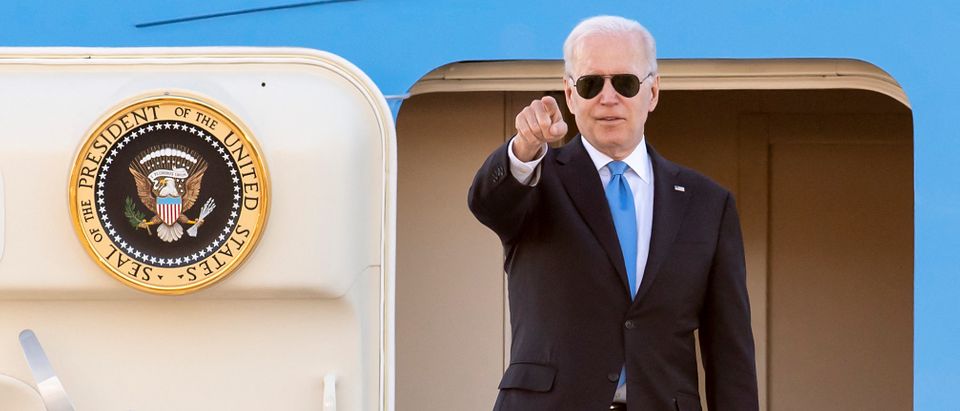There seems to be something unusual whenever American leaders make important pronouncements in terse, six-word sentences.
President Joe Biden’s March 26 “major address” in Warsaw, Poland, said all the right things about Russia’s invasion of Ukraine. As often happens when Biden speaks, however, he stutters and garbles his phrases; his voice rises and falls awkwardly. His Warsaw speech was workmanlike, and there were no memorable lines – until his supposed “ad lib” at the speech’s conclusion.
The entire world has now focused on Biden’s concluding six words: “… this man cannot remain in power!” Biden uttered what has no doubt been on the mind of every sincere, freedom-loving person around the world since Putin invaded Ukraine. Given Putin’s clearly documented atrocities and war crimes, where does he end up when the fighting stops?
The short answer is this: rotting in a jail cell like former Serbian president Slobodan Milosevic. There is no possible way for Putin the pariah to return to the global stage as a credible player. No more G-8s or G-20s, or even the annual U.N. General Assembly openings in New York City.
Biden’s ad lib joins other famous pronouncements by American leaders. Whether intended at the time, these brief remarks have proven to have significant consequences.
On August 11, 1984, as Ronald Reagan was preparing his weekly Saturday radio address to the nation, he was unaware that he was speaking into a live microphone when he joked: “We begin bombing in five minutes.”
That one, of course, had to be walked back immediately.
Reagan had already described his Cold War strategy in 1977 when he told Richard Allen in four crisp words: “We win; they lose.” As president, Reagan never walked back this one-liner.
Perhaps the most famous six-words of Reagan’s presidency came on June 12, 1987, when he stood before Berlin’s Brandenburg Gate and said, “Mr. Gorbachev, tear down this wall!”
As we now know, those six words went back-and-forth as the speech was evolving. Cautious diplomats wanted them out; Reagan wanted them in. Reagan didn’t care about the Soviet Union’s reaction; his instincts were sound.
Matters turned out differently, however, for Reagan’s vice president, George H.W. Bush. At his August 18, 1988, GOP presidential nomination acceptance speech, Bush eagerly belted out speechwriter Peggy Noonan’s words about what a Bush presidency would mean when it came to income-tax policy: “Read my lips. No … new … taxes.”
Pundits have debated whether Bush should have made such a public commitment in an effort to galvanize Reagan’s political base. As everyone knows, Bush abandoned his no-new-taxes pledge in mid-1990 and acquiesced to a tax hike.
One can argue that Bush’s decision reflected sound economic and budget policies (although he never got the promised spending reductions), but the decision was a political disaster. It cost the president Reagan’s base, sparked serious primary challenges and ultimately was a major factor in his loss to Bill Clinton.
So how are we to assess Biden’s six words in Warsaw?
Neither former Obama Homeland Security Secretary Jeh Johnson nor former Obama Director of National Intelligence James Clapper, Jr. were troubled by Biden’s remarks. My instincts tell me that Biden probably had Reagan’s Brandenburg Gate speech in mind and carefully planned those concluding remarks.
The almost immediate “walking back” of Biden’s remarks was, itself, a mistake. A little strategic ambiguity might help rattle Putin.
The argument that Biden’s ad lib would enable Putin to cite Biden’s remarks as proof that the West’s goal all along had been Russian regime change lacks merit. The only people who would fall for such a claim are the same Russians who believe Putin’s disinformation campaign about needing to enter Ukraine to stop “Nazification” under a Jewish Ukrainian president.
Biden never said that the U.S. and the West were directly pursuing regime change in Russia. Yet anyone following Putin’s aggression and ongoing violations of international law since February 24, 2022, would agree: Putin must go.
Diplomats often like to dance around reality. Sometimes, however, speaking truth to power can be the most effective diplomacy and actually end hostilities sooner.
It’s time for the West to stop worrying about what Putin thinks. To date, he’s been setting the terms of the escalating Ukrainian violence.
If Biden’s six words were another gaffe, they were perhaps his best gaffe ever.
Biden was crystal clear. Like Reagan at Brandenburg, he should now stand by his famous six-word finale.
Charles Kolb served as Deputy Assistant to the President for Domestic Policy from 1990-1992 in the George H.W. Bush White House


